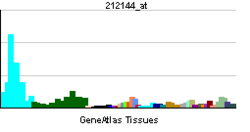UNC84B
Protein unc-84 homolog B is a protein that in humans is encoded by the UNC84B gene.[1][2][3]
References
- ↑ Raff JW (Feb 2000). "The missing (L) UNC?". Curr Biol 9 (18): R708–10. doi:10.1016/S0960-9822(99)80446-1. PMID 10508607.
- ↑ Malone CJ, Fixsen WD, Horvitz HR, Han M (Aug 1999). "UNC-84 localizes to the nuclear envelope and is required for nuclear migration and anchoring during C. elegans development". Development 126 (14): 3171–81. PMID 10375507.
- ↑ "Entrez Gene: UNC84B unc-84 homolog B (C. elegans)".
Further reading
- Andersson B, Wentland MA, Ricafrente JY et al. (1996). "A "double adaptor" method for improved shotgun library construction.". Anal. Biochem. 236 (1): 107–13. doi:10.1006/abio.1996.0138. PMID 8619474.
- Yu W, Andersson B, Worley KC et al. (1997). "Large-scale concatenation cDNA sequencing.". Genome Res. 7 (4): 353–8. doi:10.1101/gr.7.4.353. PMC 139146. PMID 9110174.
- Ishikawa K, Nagase T, Suyama M et al. (1998). "Prediction of the coding sequences of unidentified human genes. X. The complete sequences of 100 new cDNA clones from brain which can code for large proteins in vitro.". DNA Res. 5 (3): 169–76. doi:10.1093/dnares/5.3.169. PMID 9734811.
- Dunham I, Shimizu N, Roe BA et al. (1999). "The DNA sequence of human chromosome 22.". Nature 402 (6761): 489–95. doi:10.1038/990031. PMID 10591208.
- Hoffenberg S, Liu X, Nikolova L et al. (2000). "A novel membrane-anchored Rab5 interacting protein required for homotypic endosome fusion.". J. Biol. Chem. 275 (32): 24661–9. doi:10.1074/jbc.M909600199. PMID 10818110.
- Hartley JL, Temple GF, Brasch MA (2001). "DNA cloning using in vitro site-specific recombination.". Genome Res. 10 (11): 1788–95. doi:10.1101/gr.143000. PMC 310948. PMID 11076863.
- Wiemann S, Weil B, Wellenreuther R et al. (2001). "Toward a catalog of human genes and proteins: sequencing and analysis of 500 novel complete protein coding human cDNAs.". Genome Res. 11 (3): 422–35. doi:10.1101/gr.GR1547R. PMC 311072. PMID 11230166.
- Grønborg M, Kristiansen TZ, Stensballe A et al. (2003). "A mass spectrometry-based proteomic approach for identification of serine/threonine-phosphorylated proteins by enrichment with phospho-specific antibodies: identification of a novel protein, Frigg, as a protein kinase A substrate.". Mol. Cell Proteomics 1 (7): 517–27. doi:10.1074/mcp.M200010-MCP200. PMID 12239280.
- Sun G, Yuen Chan S, Yuan Y et al. (2002). "Isolation of differentially expressed genes in human heart tissues.". Biochim. Biophys. Acta 1588 (3): 241–6. doi:10.1016/S0925-4439(02)00171-0. PMID 12393179.
- Strausberg RL, Feingold EA, Grouse LH et al. (2003). "Generation and initial analysis of more than 15,000 full-length human and mouse cDNA sequences.". Proc. Natl. Acad. Sci. U.S.A. 99 (26): 16899–903. doi:10.1073/pnas.242603899. PMC 139241. PMID 12477932.
- Schirmer EC, Florens L, Guan T et al. (2003). "Nuclear membrane proteins with potential disease links found by subtractive proteomics.". Science 301 (5638): 1380–2. doi:10.1126/science.1088176. PMID 12958361.
- Ibarrola N, Kalume DE, Gronborg M et al. (2004). "A proteomic approach for quantitation of phosphorylation using stable isotope labeling in cell culture.". Anal. Chem. 75 (22): 6043–9. doi:10.1021/ac034931f. PMID 14615979.
- Collins JE, Wright CL, Edwards CA et al. (2005). "A genome annotation-driven approach to cloning the human ORFeome.". Genome Biol. 5 (10): R84. doi:10.1186/gb-2004-5-10-r84. PMC 545604. PMID 15461802.
- Gerhard DS, Wagner L, Feingold EA et al. (2004). "The status, quality, and expansion of the NIH full-length cDNA project: the Mammalian Gene Collection (MGC).". Genome Res. 14 (10B): 2121–7. doi:10.1101/gr.2596504. PMC 528928. PMID 15489334.
- Wiemann S, Arlt D, Huber W et al. (2004). "From ORFeome to biology: a functional genomics pipeline.". Genome Res. 14 (10B): 2136–44. doi:10.1101/gr.2576704. PMC 528930. PMID 15489336.
- Crisp M, Liu Q, Roux K et al. (2006). "Coupling of the nucleus and cytoplasm: role of the LINC complex.". J. Cell Biol. 172 (1): 41–53. doi:10.1083/jcb.200509124. PMC 2063530. PMID 16380439.
- Mehrle A, Rosenfelder H, Schupp I et al. (2006). "The LIFEdb database in 2006.". Nucleic Acids Res. 34 (Database issue): D415–8. doi:10.1093/nar/gkj139. PMC 1347501. PMID 16381901.
